Acorn Park |
Project Altair |
The Apple Orchard |
The Atari Arcade |
The Cloning Lab |
The Commodore Station
The Compaq Conservatory |
The Franklin Gallery |
John's Play Room |
The PX |
The Sinclair Gallery
Terminal Patient Ward |
TI Tronix Lab |
TRS-80 |
The Xerox Room
Lost? Head back to the Lobby
The Commodore Station
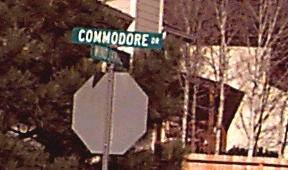
Original photo by Roy Crosthwaite
Commodore Dr. Colorado Springs, CO
Taken with a Kodak DC50 Zoom digital camera. 756 x 504 pixel 24 bit color
Lens 111mm - set for auto focus and auto exposure
Archaic Computer Photo Gallery

circa 1977 PET2001
The original PET 2001 computer (PET2001/8k) was wood, then metal cased. A few shipped with 4k.
6502 microprocessor
8k RAM
8k ROM
BASIC V1, 2, 3, and 4 (this one has 4)
builtin Datassette
builtin monochrome 40 column monitor
IEEE-488 bus
RS-232c interface
this one has 3rd party added external keyboard, internal speaker, and reset switch.

circa 1978 PET2001/8b
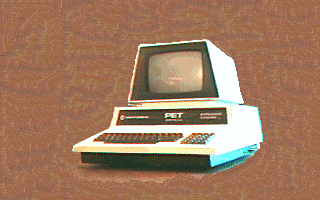
The PET2001/8b has a business keyboard, referred to on face as a professional computer.

circa 1979 CBM2001
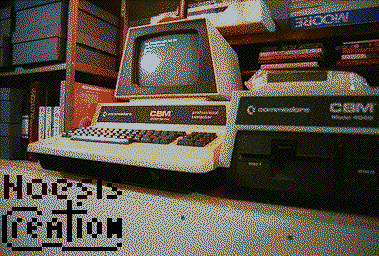
Here is the second PET-like machine I ever encountered, the CBM 2001.
(A friend in college had a PET/CBM in a streamline SCI-FI powder-grey case.)
This puppy sports 32k memory and a 40 column monochrome display.
Next to it is the IEEE-488 CBM4040 disk drive with a C2N Datassette on top.

circa 1980 PET4032

One of the generic PET computers, could be business -- could be hobby, the PET 4032 here is one of the double matrix, large screen ones.
While it's screen size is that of the 8032, it is only 40 columns wide.
This machine has a whopping 32k of Random Access Memory.
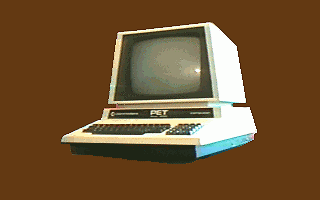
circa 1980 CBM8032-32B
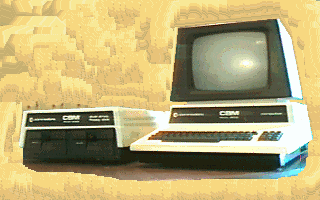
The 80 column professional computer, this one is the 8032-32B with the Black Face and the monitor is a little higher -- 32k.

circa 1981 VIC20
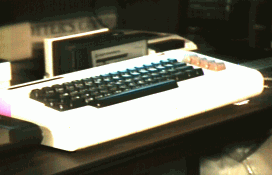
Once referred to as the Color PET by Commodore engineers, the VIC20 was one of the history making machines -- the $300 dollar barrier breaker!
The VIC22 was thought to be too harsh, Vixen wasn't a good image...VIC20 sounded Space Age.

circa 1982 commodore 64
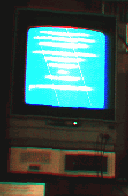
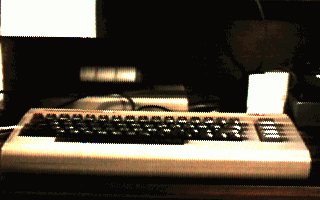
One of the largest selling micros in history, numbers are guestimated between 16 and 22 million units sold (we all know how bad Commodore was at book keeping).
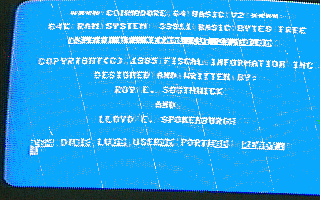
A close up a the C64-LT. Kernel boot up screen.

circa 1983 SX-64
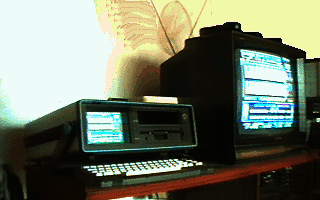
Commodores solution to the luggable, and what a solution.
circa 1983 SuperPET 9000
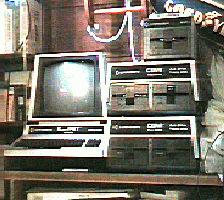
A wonderful dual processor machine.
The 6502 (MOS Technology 6502) was, of course, an 8 bit chip while the 6809 (Motorola MC6809) was a 16 bit.
The computer can access 32768 bytes of standard RAM as well as 16 banks of 4096 bytes for a total 65536 bytes of RAM!
The 16-bit utilizes the Waterloo Software that came with it (programming languages):
Waterloo microBASIC
Waterloo microPASCAL
Waterloo microFORTRAN
and Waterloo microAPL
-- Yep -- that last one was once Bill Gates favorite language and he never really did get a good version onto the micro.
circa 1983 B128 80
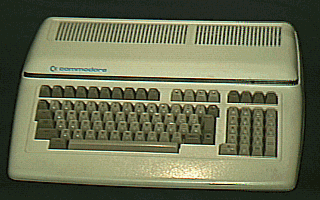
The commodore B128 80
80 column by 25 line screen display
Separate calculator keypad for quick computations
10 predefined function keys w/20 programmable
Extended BASIC V4.0+
128k memory expandable to 512k
IEEE-488 bus
RS-232c interface
6509 microprocessor
direct audio lineout
6581 Sound Interface Device (SID!)


circa 1984 plus/4
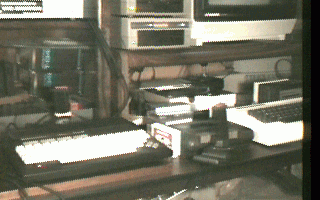
The TED chip based plus/4. This was a unique machine, as commodore had big plans that kinda fizzled; the 264 and the 364 (a version of the 264 with speech). The 264 was to be custom to the customers desire -- software builtin, chosen by the customer. Kind of a cool idea, especially when hard drives from commodore were pricy and required an IEEE-488 interface. The plus/4 may have well been called the Limping Phoenix as it was not quite the machine planned and the 364 was canned. This puppy sports a word processor, spreadsheet daisywheel graphing program and an imaginary 4th program (one would assume the BASIC programming language). The software is rather cruddy -- not crude -- cruddy. I hate embedded codes in WPs and this one has plenty. It is not easy, but if you have the manual next to you, you can really do some things with this puppy.



circa 1984 (C16)

circa 1985 (C128)




circa 1985 Amiga 1000


circa 1986 C64C
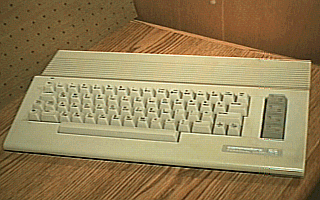

circa 1987 commodore 128D
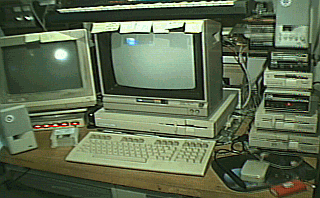
This 128D is loaded: CMD's SuperCPU (a 20MHz accelerator!) w/16Meg fast RAM, a 1750 REU w/512k, Jason-Raniem's CAPTURE (primarily used to exit games that start at DEC64738) plugged into a 4Meg RAMLink, FD-4000 (3.5inch floppy stores up to 3.2Megs per ED disk), HD85 (85Meg Hard Drive), 1541-II, 1571 w/JiffyDOS, CA MMS2 stereo speakers (the commodore logos are patches sent to me from John ;) , Realistic Electronic Reverb and Realistic Stereo Parametric Equalizer for enhanced fake stereo SID sound, 80 column color and 40 column grey out to an Amiga 1080 monitor and 40 column color to a commodore 1701 monitor, HP Deskjet 500 w/Epson FX-80 cartridge connected via a Card? G+ interface for seamless (intelligent) commodore or Epson printer output, a Laserjet 4ML for postscript out, a Casio MT-540 (CX6000 clone) musical PCM keyboard, M3 mouse (proportionate, joystick and paddle modes), an Inkwell Systems 170 Lightpen, Epix 500XJ and 300X Competition Pro joysticks on a switch at the end of a 10foot extension cable. Did I get it all?

This is what it really looks like.
circa 1987 Amiga 500

Amiga 500 with the A570 CD-ROM drive. 2cool!
circa 1987 Amiga 2000
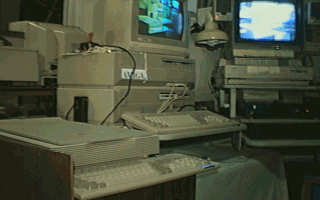
The bottom 2000, is an Amiga 2000HD with a GVP G-Force 030 40MHz accelerator, loaded with 18Megs of RAM (2 graphics 16 fast), an EMPLANT Mac emulator, two HDs; 720Meg & 1.5gig HD, HP Scanjet IIc, Digi-View (video digitizer w/color splitter), Perfect Sound (audio sampler), 38.4k modem, 286 bridge board, 5.25inch HD floppy, 3.5inch DD floppy, 3.5inch HD floppy.

The top is the Harbor Lights Amiga 2000!
circa 1987 COLT PC10/20
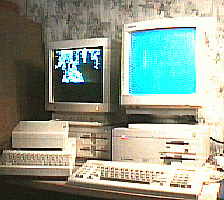
This is a 12.25MHz Commodore COLT (right). OOOOooo, a capital "C" machine! A 20Meg HD, 720k 3.5 inch floppy and a 5.25 inch floppy. That is an Apple //c sitting next to it with another COLT under the Apple monitor.


circa 1991 CDTV
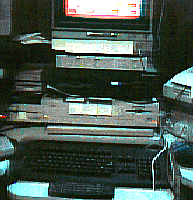
This is a Commodore CDTV and an Amiga 1000. That's a 1702 monitor with Labtec speakers. The 1000 has a Newtek Digi View with the Digidroid for scanning pics via an old, old VCR. The CDTV has keyboard, mouse, 2 floppies, A64 hardware with a 1541 II drive, an IMG scan on an MPS1250 printer, and a Golden Image Hand Scanner. Nice setup!


circa 1994 Amiga 1200

A Commodore Amiga 1200.
This was one of the last makes, models and computers, that Commodore manufactured.
It is truly a nice machine.
OS3.0
0Megs Fast RAM
2Megs Graphics RAM
256 colors -- at once without HAM mode
65k colors in HAM8 mode
Stereo Audio Out
9 voice and yes, speech
circa 1996 ESCOM Amiga ag: Amiga 1200
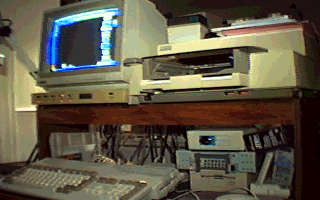
An ESCOM a.g. Amiga 1200.
This A1200 is loaded. ROM and OS info from inside the computer all says Commodore in it, even though this is an Amiga Sold from the first of many companies to buy the Amiga technology from Commodore. Despite the label on the outside, it is an Amiga through and through.
OS3.1
52Megs Fast RAM
2Megs Graphics RAM
Blizzard 060 49MHz accelerator
Blizzard 1230 SCSI w/external NEC25 CD-ROM
256 colors -- at once without HAM mode
65k colors in HAM8 mode
Stereo Audio Out
9 voice and of course, speech

circa (made 1991) 1994 C64DX aka C65
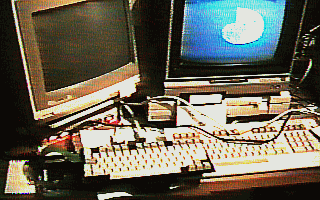
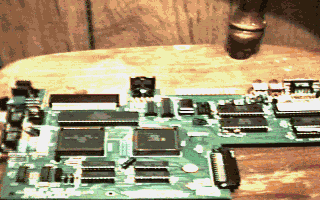
This is a C64DX Rev B mother board from the late great Commodore Business Machines.
Yes, here be the guts to the C65!
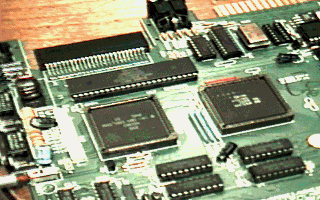

A close up of the Victor chip!

circa (made 1991) 1994 C64DX aka C65


This is a C64DX Rev B mother board from the late great Commodore Business Machines.
Yes, here be the guts to the C65!


A close up of the Victor chip!

circa 2004 commodore 64 DTV

Right at the end of their ownership of the commodore 8-bit stuff, Tulip Computers lets it go about the time this is released. Design headed up by Jerri Ellsworth of commodore one fame, moved by Mamoth Toys out of Hong Kong on QVC!

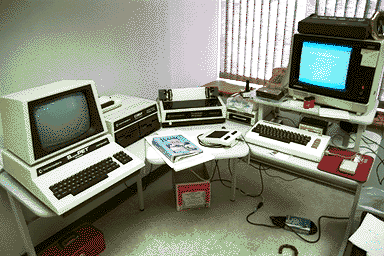
This is part of my old, old office, back in 1994!
That is a SuperPET, a 4040 drive with, yes, the Datassette on top.
Next to it is a CBM 2023p printer.
The next machine over is a VIC20 with a VICModem and 1350 mouse.
The drive, I must admit, is a fraud -- it's a commodore 1541 in a VIC1541 case.
My friend Rex gave me the case after I had bought the drive without a case for $5.
That's an MPS803 on top of an Epson COMTEX color monitor!
Those were the daze!
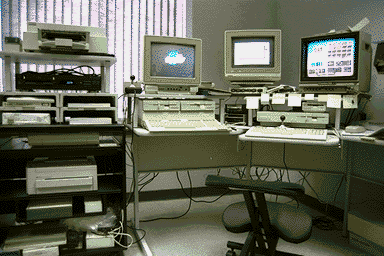
Ok, this is the other half of my old office:
CDTV on the printer stand under an HP 500C, above an MPS1270 Inkjet, and HP4ML laser printer.
That is my trusty PX-8 (Epson Geneva) CP/M notebook on the very bottom.
The next pile is a commodore 128 with KEYDOS and JiffyDOS in a Keytek bay with two 1571s
It has an Icontroller, 1802 monitor, and 128k REU.
Next we have a commodore 128D with FD4000, 1581, HD85, 1 Meg RAMLink tucked away in the back.
M3 mouse, TAC2 joystick, 1702 and 1080 monitors.
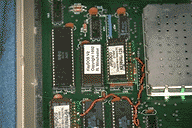
Here is the inside of that flat 128 above reveiling the KeyDOS ROM and JiffyDOS chip sets.


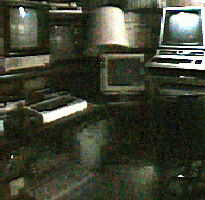
Layout of some of the above.
DL Amiga PRGs here.
DL C64 GEOS PRGs here.
DL C128/D PRGs here.

 Navigation:
Navigation:
 Back to the Lobby.
Back to the Lobby.
 Go to John's Play Room.
Go to John's Play Room.
 Go to The Atari Arcade.
Go to The Atari Arcade.
 Go to Cloning Lab.
Go to Cloning Lab.
 Go to the PX.
Go to the PX.
 Go to The Sinclair Gallery.
Go to The Sinclair Gallery.
 Go to The Franklin Gallery.
Go to The Franklin Gallery.
 Go to The Compaq Conservatory.
Go to The Compaq Conservatory.
 Go to The Xerox Room.
Go to The Xerox Room.

Acorn Park |
Project Altair |
The Apple Orchard |
The Atari Arcade |
The Cloning Lab |
The Commodore Station
The Compaq Conservatory |
The Franklin Gallery |
John's Play Room |
The PX |
The Sinclair Gallery
Terminal Patient Ward |
TI Tronix Lab |
TRS-80 |
The Xerox Room
Lost? Head back to the Lobby
© 1997, 1998, 1999, 2000, 2001, 2002, 2005 noesis0@noesiscreation.org
![]()
![]()
![]()
![]()
![]()
![]()
![]()





![]()












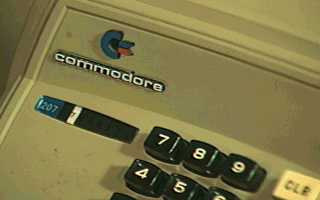
![]()
 Navigation:
Navigation: Back to the Lobby.
Back to the Lobby. Go to John's Play Room.
Go to John's Play Room. Go to The Atari Arcade.
Go to The Atari Arcade. Go to Cloning Lab.
Go to Cloning Lab. Go to the PX.
Go to the PX. Go to The Sinclair Gallery.
Go to The Sinclair Gallery. Go to The Franklin Gallery.
Go to The Franklin Gallery. Go to The Compaq Conservatory.
Go to The Compaq Conservatory. Go to The Xerox Room.
Go to The Xerox Room.